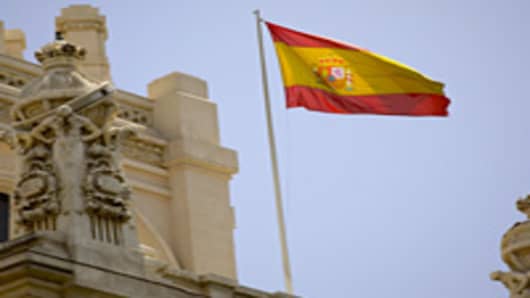Until recently, Jordi Parellada a singing teacher from Barcelona, would never have seen himself voting for Catalan independence.
On Sunday – as the northern Spanish region with an economy the size of Portugal appears poised to elect a government committed to holding an independence referendum in two to three years – Mr. Parellada's journey from unionist to separatist will become complete.
"If you had asked me six years ago, if I wanted independence from Spain, I'd have said no," the 56-year-old says. "But now I see no other option for Catalonia. Back then I was Catalan and Spanish. Now, I'm just Catalan".
Catalonia, like Spain, is languishing in deep recession. The region has been forced to make deep public spending cuts and request a €5 billion rescue from Spain's central government to avoid defaulting on its debt.
(Read More: Euro Zone Slips Into Second Recession Since 2009)
Conversions such as Mr Parellada's have occurred across Catalonia as the crisis has accelerated, with polls indicating support for an independent Catalan state at 44 percent last month, compared with 13 percent in 2006.
What would appear to be a family dispute, embittered by increasingly acrimonious exchanges between politicians from Spain's ruling rightwing Popular party and Catalan nationalists, could have consequences far beyond the Iberian peninsula.
As Mariano Rajoy, Spain's prime minister, battles with an economic crisis likely to see him request a European rescue, the prospect of Spain losing control of a region responsible for more than a fifth of its economic output would be disastrous.
(Read More: Spain's Rajoy Gets Mixed Message in Regional Votes)
"What the independence of Catalonia really means is the disappearance of Spain as a nation," was the stark assessment of Alberto Ruiz-Gallardón, Spain's justice minister, in an interview.
Among Spain's European allies, who themselves must weigh what conditions would be attached to any future aid, diplomats question why they would want to pay for Spain if one of its own regions will not.
For Artur Mas, leader of the region's ruling Convergència i Unió party and previously an opponent of outright separatism, Catalonia's historically uneasy relationship with Spain's central government has reached an impasse.
Mr Mas argues that Catalonia must be granted control over its tax revenue, as enjoyed by the Basque region. While his party built up a debt pile of €42 billion the largest in Spain, the CiU argues that Catalonia would be in far less trouble if fewer revenues were transferred to Spain's poorer south.
But his overtures to Mr Rajoy to reform the way that Catalonia is financed were rejected out of hand by the prime minister, prompting Mr Mas to trigger snap elections and demand the right for Catalans to be allowed to vote for self determination.
Neither side appears ready to compromise.
"For Mas this election will allow the cementing of a legacy for someone who is often seen as a lightweight and for Rajoy, while the vote creates large uncertainty around Spain internationally, it plays well to his supporters domestically," says Pankaj Ghemawat, a professor at the IESE business school in Barcelona.
A poll by the La Vanguardia newspaper showed the CiU party winning between 64 and 66 of the Catalan parliament's seats – close to achieving an absolute majority of 68. Combined with the 15-17 seats forecast for the separatist Esquerra Republicana party, Mr Mas would be well positioned to form a ruling coalition.
(Read More: Why Bond Markets Are Dancing to Rajoy's Tune)
Experts from both sides of the debate have lined up to argue why Catalonia would be better off outside Spain, or instead how a region unable to borrow money internationally would suffer a huge outflow of capital and risk its economy withering outside the EU.
For Juan Rubio Ramirez, a Catalan born professor of Economics at Duke University in the US, proponents of both sets of arguments have tended to masquerade as coldly analytical when in fact they are laced with nationalist sentiment.
As the debt storm spreads Europe's leaders battle to save the eurozone
"Citizens in rich Catalan cities transfer resources to poor areas of Spain in the same way as they do to poorer areas of Catalonia but the first transfer seems to disturb much more than the second and I cannot avoid seeing the sentimentality inside that asymmetry."
Politicians from both Mr Rajoy's Popular party, which is staunchly committed to preserving the geographic integrity of Spain, and those from Mr Mas's CiU have adopted increasingly inflammatory rhetoric.
Catalan MEPs in September demanded the resignation of Alejo Vidal-Quadras, a European parliament vice-president and senior member of the Popular party, who called for the intervention of the Civil Guard in Catalonia if referendum plans went ahead.
Less reported was a later statement by Catalonia's interior minister, Felip Puig, who said his regional police force would be loyal to the Catalan government in the case of a territorial dispute. The trade unions and Catalan opposition parties accused Mr Puig of politicizing a public service
More detached observers hope that if Mr Mas wins a mandate on Sunday to go ahead with a referendum, both he and Mr Rajoy will be drawn back to the negotiating table.
"For a European democracy to be having these kinds of discussions is frankly quite alarming," says Professor Ghemawat. "The fact they are arguing about who would control paramilitary forces in the case of a referendum is more associated with countries with a more recent history of coup d'états."


